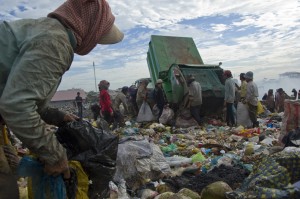Jun 4, 2009 0
Phnom Penh takes a massive dump
Over the years, the Stung Meanchey dump has become a journalistic cliche. It has been written about, photographed and filmed, and as a result, the hundreds of dirt-poor families who work the forty hectares of steaming trash have become international icons of third-world poverty.
But next month the notorious dump will finally close, and the 1,000 tonnes of trash that arrive each day will be heading to a new dump located about 15 kilometers outside of the city, leaving tourists, expatriates and journalists in need of a new stand-in for the excesses of modernity (which the community, quite literally, lives off of).
Despite the years of press attention, donations and NGO-run schools and training programs, life for Stung Meanchey’s residents remains grim.
Last week, Phorn Sreymean, 14, sprinted towards an incoming garbage truck, hoping to fish out plastic bottles and cans before the dozen or so other people clustered around the back of the truck get to them first.
When the truck lifted its tray, garbage rained down and the bravest of Phnom Penh’s scavengers – including Phorn Sreymean – stood right below hoping to scoop out the most lucrative recyclables.
Scavenging can be a high-risk occupation, especially for young people. In February, a cart on top of a dump truck fell onto a teenager, and she fell headfirst onto her metal pick, killing her.
The garbage fires at the Stung Meanchey dump are a long-term hazard, releasing large amounts of dioxins into the air, a known cancer-causing agent. Phymean Noun told me that her students often have skin, hair and lung problem, even though most no longer work at the dumpsite.
Yet news that the dump, which opened in 1965, will be closed has instilled fear, rather than relief, to the 1,000 families people that depend on it.
“I am worried that when this dump site moves I won’t be allowed to work anymore,” Phorn Sreymean said, adding that losing her current daily income of about 5,000 riel ($1.25) would spell disaster for her and her family.
Though it’s easy for journalists in Cambodia to role their eyes whenever an international reporter helicopters in and tries to capture the Dickensian aspects of third-world modernity, international attention has helped bring in funds to the NGOs that train members of the dump community.
Though Phorn Sreymean fears what will happen to her family when the dumpsite closes, she does not want to scavenge forever. She has another dream, one where the NGOs can help:
“Sometimes I am really disappointed with myself that I was born into a very poor family and have to work at the dump since I was young,” Phorn Sreymean said, “I want to be a beauty specialist.”
Co-reported with Mom Kunthear
A version of this was published in the Phnom Penh Post on June 3

